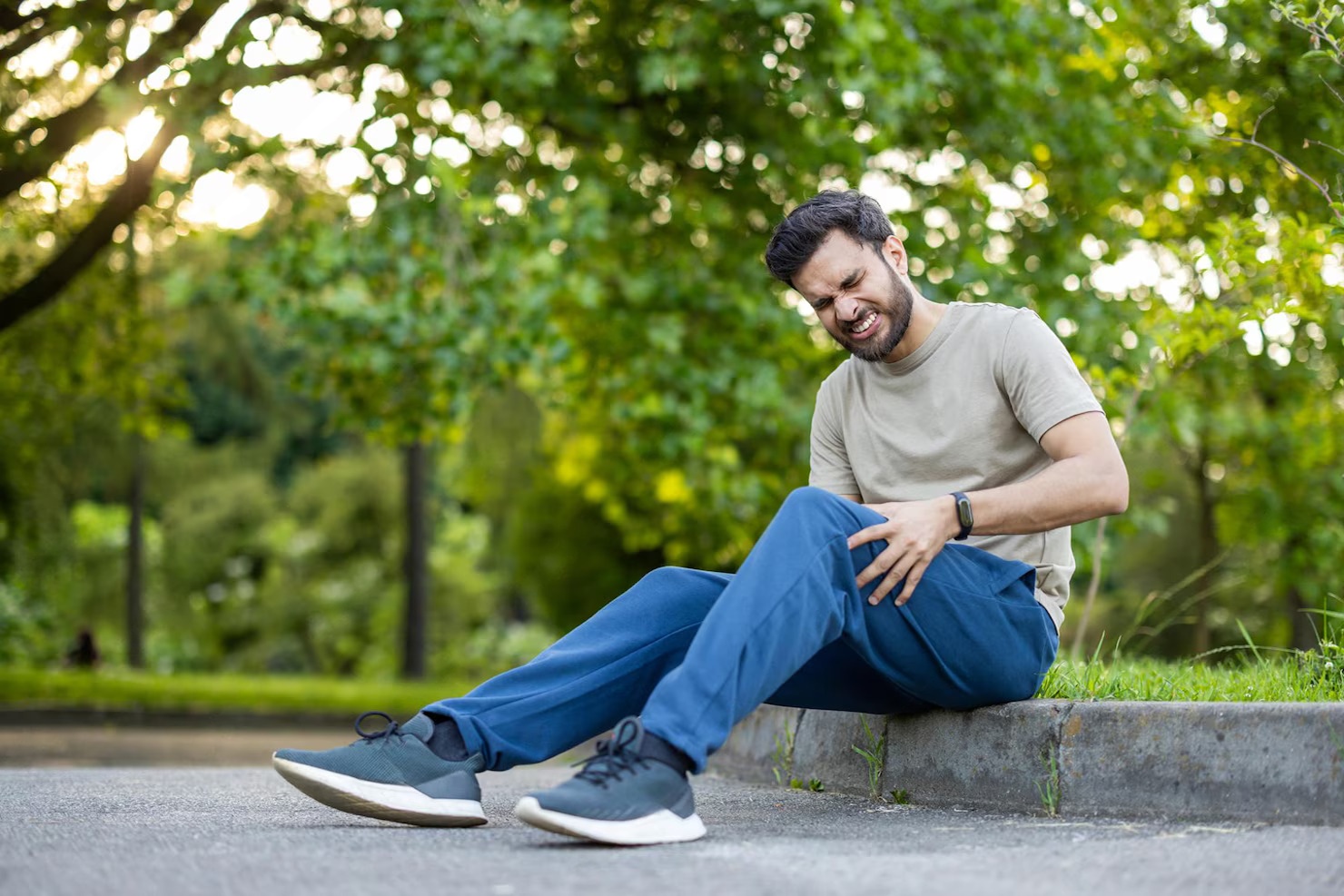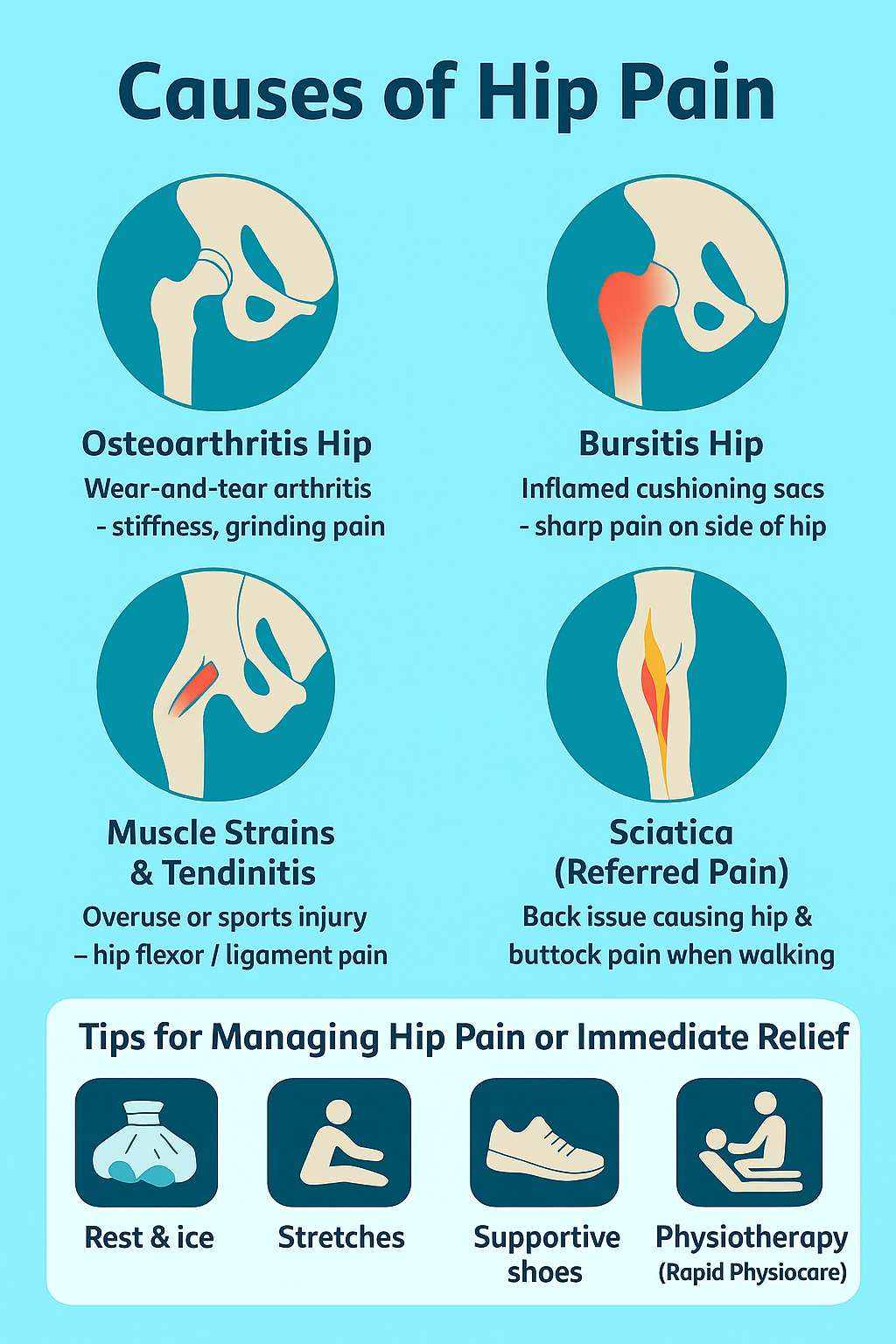
Hip Pain When Walking: Causes, Treatment & Relief
Wincing with every step? Hip pain when walking is a common issue in Singapore, especially for active adults exploring our urban landscape or desk workers spending long hours seated. That nagging ache or sharp sting can turn a simple stroll through Marina Bay or a hike on Bukit Timah trails into a chore.
The good news is that you’re not alone, and solutions exist. This guide will help you understand the causes of hip pain, find immediate relief, and discover long-term strategies to get you moving comfortably again.
Common Causes of Hip Pain When Walking
Understanding the root of your discomfort is the first step toward treatment. Here are the most frequent culprits behind hip joint pain when walking in Singapore:
Osteoarthritis Hip: This “wear-and-tear” osteoarthritis hip condition is a leading cause of hip pain when walking, especially in older adults. The protective cartilage cushioning your hip joint wears down, leading to pain, stiffness, and a grinding sensation.
Bursitis Hip: Do you feel a sharp, localized pain on the sore side of your hip? This could be bursitis hip—inflammation of the fluid-filled sacs (bursae) that cushion the joint. It’s often triggered by repetitive activities like running or prolonged standing on hard surfaces.
Muscle Strains & Tendinitis: Overexertion during sports or a sudden movement can lead to hip flexor pain or a hip ligament pain. This is common among weekend warriors who may overdo it on the soccer field or at the gym.
Sciatica Referred Pain: Not all back hip pain originates in the hip. Sciatica, caused by compression of the sciatic nerve in the spine, can cause pain that radiates down the buttock and hip, often feeling worse when you walk.
Labral Tears: The hip labrum is a ring of cartilage that helps secure the joint. A tear, often from repetitive twisting motions or sports, can cause a deep ache in the groin, a catching sensation, and hip pain when rotating leg out.
Other Common Causes
- Hip impingement (FAI)
- Tendonitis hip pain
- Stress fractures
- Arthritis (inflammatory conditions)
- Groin pain when walking (from muscle or ligament issues)
Singapore-specific factors like prolonged sitting in office chairs, walking on unforgiving concrete pavements, and intense weekend hiking can exacerbate these conditions.
When to See a Doctor in Singapore
While mild pain can often be managed at home, certain “red flags” warrant a visit to a hip pain specialist Singapore residents trust. Seek professional help if you experience:
- Severe pain that prevents you from bearing weight on your leg.
- Hip pain that wakes you up at night.
- Significant swelling, redness, or warmth around the joint.
- Right hip pain or left hip pain that persists for more than a few weeks despite rest.
For expert care, Rapid Physiocare specializes in non-surgical hip pain treatment and offers comprehensive physiotherapy for hip pain with same-day appointments available.

Immediate Relief at Home
For sudden or mild hip pain when walking, try these methods to reduce discomfort:
Rest & Ice: Give your hip a break from aggravating activities. Apply an ice pack wrapped in a towel to the painful area for 15-20 minutes several times a day to reduce inflammation.
Over-the-Counter Solutions: Anti-inflammatory medications (NSAIDs) can help manage pain and swelling. For topical relief, many in Singapore find Counterpain cream effective for soothing muscular aches.
Gentle Stretches: Tight muscles can contribute to pain. Try a gentle hip flexor stretch or a piriformis stretch to alleviate tension. This is also a key answer for those wondering how to relieve hip pain when walking after an activity like dancing (hip hurts after dancing).
People Also Read: Hip Bursitis – Symptoms, Diagnosis, Treatment, and Exercises to Relieve Hip Pain
Tips for Managing Hip Pain
Addressing the underlying cause is key to lasting relief. Here’s how to build resilience in your hips:
Strengthening Exercises: The best long-term strategy for how to strengthen hip joints is targeted exercise. Focus on building hip stability with exercises like clamshells (for glutes), bridges (for hamstrings and glutes), and gentle squats. Strong muscles act as shock absorbers for your joints.
Posture Adjustments: If you think, “my hip hurts when I sit,” your posture is likely the issue. Use an ergonomic chair, keep your feet flat on the floor, and avoid crossing your legs for long periods. Set a timer to stand up and walk around every 30 minutes.
Footwear Tips: Singapore’s urban environment means a lot of time on hard surfaces. Invest in supportive, well-cushioned shoes with good arch support to minimize impact on your hips with every step.
FAQs: Your Hip Pain Questions Answered
Why do my hips hurt when I walk but not at rest?
This is classic of conditions like osteoarthritis hip or bursitis hip. The act of walking places a dynamic load on the joint, irritating inflamed structures. At rest, that load is removed, so the pain subsides.
Is front hip pain when walking serious?
Front hip pain when walking often points to hip flexor pain or issues with the hip joint itself. While a muscle strain may heal with rest, persistent front groin pain can indicate a joint problem like arthritis or a labral tear, which should be evaluated by a doctor.
Can sitting too much cause hip pain?
Absolutely. Prolonged sitting leads to tight hip flexors and weak gluteal muscles, creating a muscle imbalance that pulls on the pelvis and causes hip pain when walking. This is a very common issue in desk-bound professionals.
Conclusion
Managing hip pain while walking requires patience, the right treatment, and consistency. Ignoring the discomfort or pushing through can make it worse. Instead, listen to your body, rest when needed, and focus on a structured recovery plan.
To sum up:
- Understand what’s causing your hip pain before starting exercises.
- Use rest and gentle movements to avoid strain.
- Strengthen your hip gradually to regain stability and mobility.
- Seek expert guidance if pain persists or worsens.
At Rapid Physiocare, we offer targeted care for hip conditions. Our Musculoskeletal Conditions focuses on joint and muscle issues that affect mobility. If you’ve had surgery such as a Total Hip Joint Replacement (THJR), our Pre/Post Operative rehab programs ensure a safe and effective recovery. For persistent or chronic hip pain, Shockwave Therapy can accelerate tissue repair, while Manual Lymphatic Drainage helps reduce swelling and stiffness.
With the right professional support and a tailored treatment plan, you can move confidently again — free from hip pain. Ready to move pain-free? Book an appointment with our hip pain physiotherapist today.
Tags : Hip pain, Hip pain when walking, Hip pain while walking


